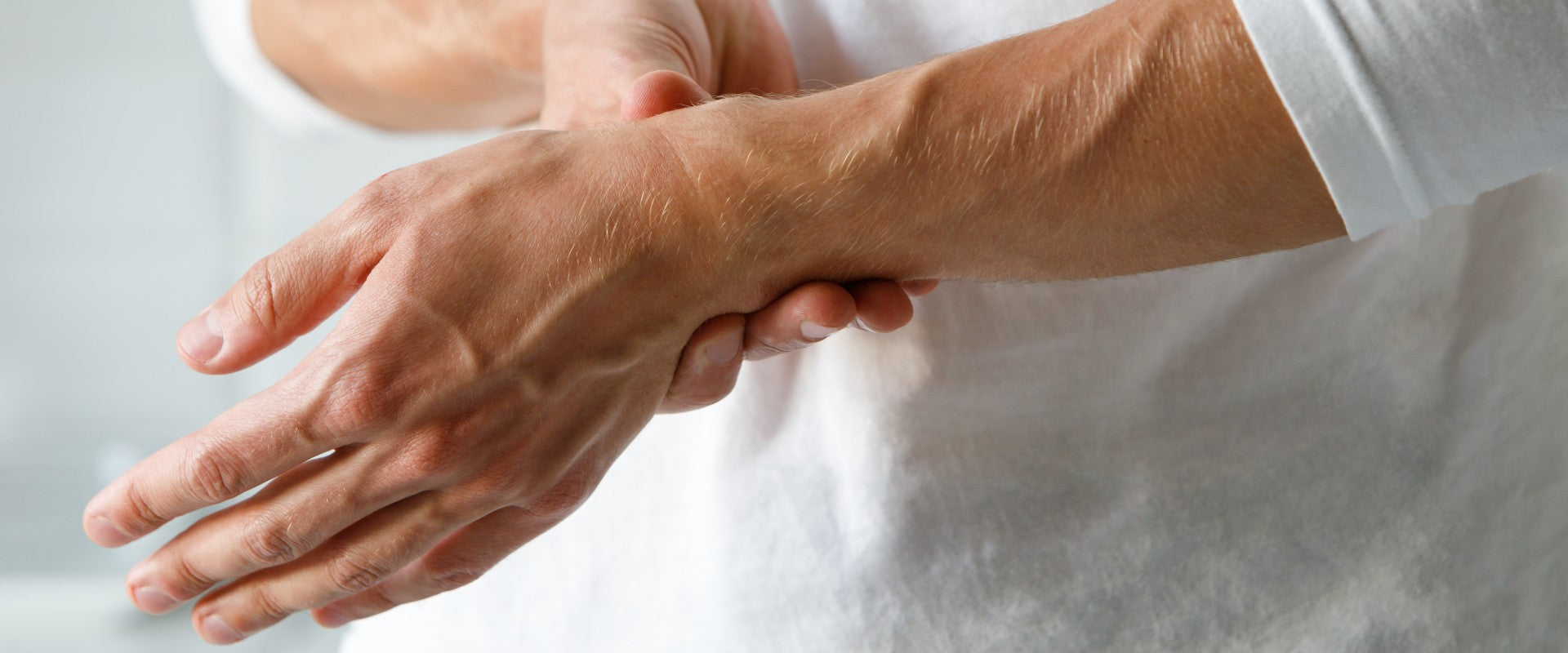Why Do My Arms Go Numb When I Sleep?

Waking up with a numb sensation in one or both arms can be an alarming experience, you’re half asleep wondering what time it is before you realize you’ve pins and needles in your arms. Thankfully, in most cases, there is a simple explanation and solution.
More often than not, there’s usually a simple explanation, perhaps you rolled over on your arm while sleeping and your weight temporarily stopped the blood flow. A simple arm and hand massage will usually bring it back to life but some medical conditions can cause numbness in hands while sleeping.
Let’s talk about what causes arms falling asleep at night and what you can do to find relief.
Why Do My Arms Go Numb When I Sleep?
Sleeping on your arm restricts the blood flow and can cause a numb sensation in the arm and hand. Typically this is short-lived and a simple message can wake it up. Apart from your sleep position, carpal tunnel syndrome, diabetes, and vitamin B-12 deficiency can cause numbness in hands while sleeping and why arms fall asleep at night.
- Sleeping Position: Falling asleep on your arms restricts blood flow and puts pressure on the nerves, causing your arms and hands to go numb. Stomach sleepers are more prone to arms falling asleep at night.
- Carpal Tunnel Syndrome: Causes numbness, pain, and tingling sensations in the arms and hands. It occurs when the median nerve (major nerve in the hand that runs from the forearm) is compressed at the wrist. It can be caused by diabetes, autoimmune disorders, trauma to the wrist, high blood pressure among other medical conditions.
- Diabetes: Those with diabetes are at a greater risk of developing nerve damage. When high levels of sugar and fats in the blood cause damage to the never endings over a prolonged period. Diabetic neuropathy symptoms include numbness and tingling in the feet and legs but can also affect the arms and hands.
- Vitamin B-12 Deficiency: Adults over 50 years of age, vegetarians, vegans, and people with irritable bowel syndrome are prone to vitamin B-12 deficiency. Being low in vitamin B-12 can cause anemia and a tingling sensation in the arms. It is an essential vitamin for the healthy function of the central nervous system.
- Alcohol: Overindulging in alcohol can cause nerve tissue damage, alcoholic neuropathy. Symptoms can include; muscle weakness, muscle cramps, and tingling sensation in the limbs.
How to Prevent Your Arms Falling Asleep at Night
- Switch your sleep position
- Don’t fold your arms under the pillow
- Sleep with your arms by your sides
- Take a vitamin supplement
- Ensure you’re eating a healthy diet full of fresh vegetables and fruit
- Take exercise every day to help your blood circulation
Why Do My Hands Go Numb While Sleeping?
Putting pressure on your hands while you sleep is the usual culprit of hand numbness at night. Therefore, adjust your sleep position so as not to put any undue pressure on the nerve, resulting in obstructing blood flow to your hands, causing the sensation of pins and needles in your hands and arms.
What Should I Do if I Wake Up with Numbness in My Hands While Sleeping?
When your hands fall asleep at night, it can be an alarming experience. If this happens, take a deep breath and relax. Chances are you’ve simply slept on your arm and a brief massage will get the blood flowing again. When hands go numb while sleeping on side, switch your sleeping position and lay your hands by your sides, never over your head or under your pillow.
When numbness in left arm is experienced it can be particularly frightening but this can be caused by many things, especially irritable bowel syndrome and acid reflux sufferers will experience numbness in left arm on occasion.
If you’re greatly concerned about any of your symptoms it’s best to seek advice from your doctor as soon as possible. In most cases, cleaning your diet, getting exercise, taking vitamin supplements, and destressing can have a positive impact on numbness in hands while sleeping.
Conclusion
If your arms fall asleep at night:
- Change your sleep position
- Ensure you’re sleeping on a quality pillow to align the spine and reduce neck pain, therefore, reducing neck pain traveling to the arms and hands
- Invest in a pressure relieving mattress that envelops your body and supports the sensitive pressure points of the back, hips, and shoulders
Your pillow can also have a significant impact on your quality of sleep. If your head is adequately supported that ensures your neck is supported, therefore, aligning the spine for a more restful sleep.
The same can be said for your bed. Sleeping on a pressure relieving mattress is more beneficial to your sleep health because your most vulnerable hip, back, and shoulder areas receive greater support.
If you’re experiencing numbness in hands while sleeping or arms falling asleep at night, changing your sleep position, upgrading your mattress and pillows, taking exercise and vitamins, and enjoying some gentle exercise can have a positive impact on symptoms, bringing restful sleep to your nights.
Disclaimer: Nolah does not provide medical advice. All resources on the Nolah blog, including this article, are informational only and do not replace professional medical counsel. Talk to your doctor about any health, mental health, or sleep-related issues.


